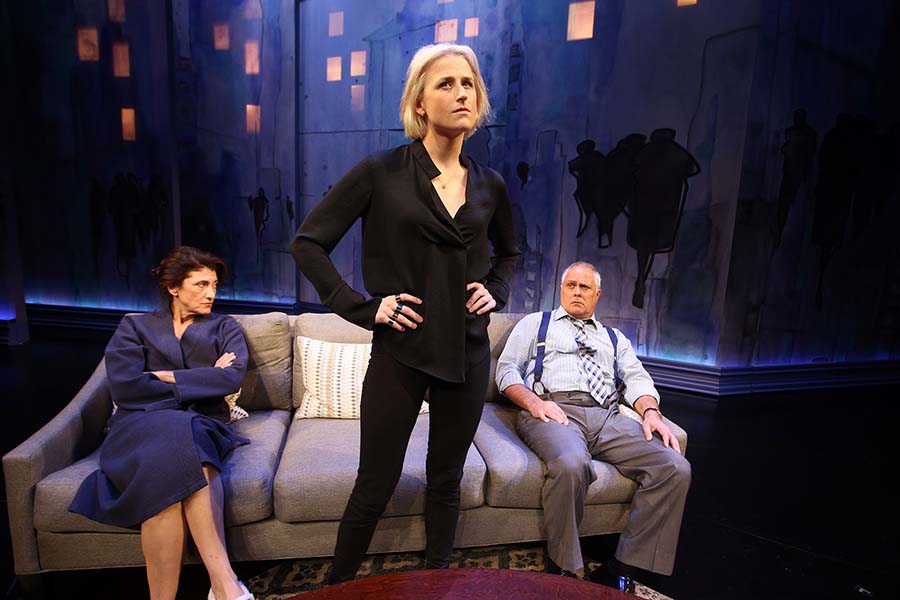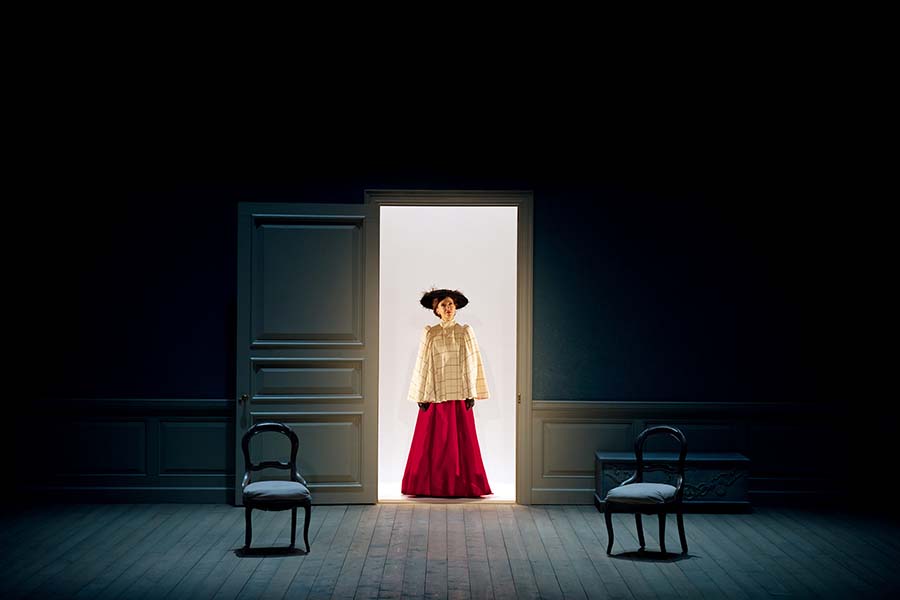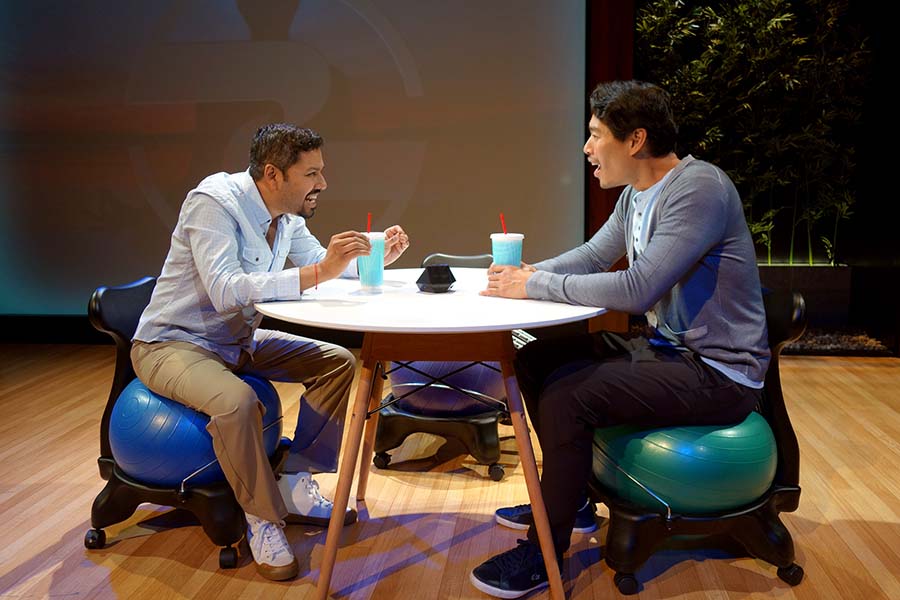Radical generosity of spirit. That’s my takeaway from the 2017 Pacific Playwrights Festival at South Coast Repertory. The welcoming and supportive nature of the Festival created an atmosphere in which one felt that great work was possible. Did it happen? We’ll get to that later.
My overall impression of the event was not accidental. Rather, the notion of inclusiveness is an integral part of the theatre’s philosophy. In my interview with Marc Masterson, South Coast Rep’s artistic director he said the theatre “wants to capture the variety that exists in American culture, in terms of the way art is made, in terms of the ways stories are made. I don’t think we’re bound by one idea of what a well-made play is, any longer. What we are looking for is variety. We want to capture all the vibrancy, all the diversity, all of the energy that exists in our culture as much as we possibly can.”
At a time when we as a field are engaged in a serious investigation of issues surrounding inclusion—of who deserves a seat at the table—Masterson’s solution is instructive: Build a bigger table and add more chairs.
John Glore, associate artistic director and co-director of PPF, echoed this commitment, calling the festival a “boutique festival,” explaining that part of the original impetus was to make theatre “not just justifiable from a financial perspective for writers, but to make them feel that what they were doing was valued.” Kimberly Colburn, the company’s literary director and co-director of PPF, noted that SCR has “a very large commissioning program, with 61 outstanding [i.e. in-process], active commissions.” This is part of the ethos at the theatre, to “actively commission more plays than we could ever produce, in a way to both support playwrights and contribute to the American theatre as a whole.”
The festival presented seven works, four as readings and three in full productions. While standard procedure prevents me from reviewing readings, I do think they all merit our attention. Firstly, Shrew! by Amy Freed, directed by Sharon Ott, and dramaturged by Mead Hunter, is a modern take on The Taming of the Shrew that still manages to keep the size, both emotionally and linguistically, of its Shakespearean forebear; Long Lost by Donald Margulies, directed by Casey Stangl and dramaturged by Jerry Patch, is a drama about the effects of a manipulative older brother who returns to the fold of a seemingly stable Upper East Side family; Cambodian Rock Band by Lauren Yee, directed by May Adrales, and dramaturged by Andy Knight, is a play with music about an expat’s return to Cambodia and his internment by the Khmer Rouge—a journey made all the more powerful by the music of Dengue Fever, whose songs are performed by the actors in the show; and Anacostia Street Lions by Tearrance Arvelle Chisholm, directed by Michael John Garcés and dramaturged by Kimberly Colburn, is set in a dystopian near-future where lions roam the streets, the government sterilizes anyone who does not receive a high enough score on a mandated test, and animals and humans mate to create new species.
Unfortunately, a lack of column inches prevents me from examining each of these readings at the the depth they deserve. But there are elements of formal experimentation in both the Chisholm and Yee that demand further scrutiny. In Anacostia Street Lions, Chisholm does world-building of a kind I’ve previously only seen in video games, then negotiates the problem he creates for himself with this choice by showing us the effects of this dystopian future world on a cross-section of its inhabitants, rather than simply telling us about it, as so many playwrights are wont to do.
In an interview, Chisholm told me, “One of the things I’m interested in writing are new narratives for black folks. A lot of my work lately has been more focused on an Afro-futuristic lean, and trying to see how the current narratives play out in the future. So to do that I had to make up a world where the given circumstances of the now could be explored; I’m able to more fully articulate and discover what’s at play when the powers that be are of my own creation.”
The Yee piece was equally impressive, but for diametrically opposed reasons. Taking a piece of history many of us thought we knew something about—the advent of the Khmer Rouge, and its attempt to totally eradicate Cambodian culture and intellectual thought, going so far as to declare a Year Zero—and putting a human face on it, Yee allows the history to resonate in a deeper, more meaningful way. This is consistent with Yee’s larger project of finding an individual story to illuminate a larger social issue, and in doing so making both more resonant. It’s the approach she takes in both King of the Yees and The Great Leap Forward, but it is employed most effectively here. At the reading I witnessed, her strong, focused narrative, combined with the propulsion of the Cambodian-influenced rock music, created an electric atmosphere, and the most passionate and connected audience I’ve ever seen at a reading. It ended in a standing ovation and calls for an encore.
Also of note is the fact that although the music was written and composed by Dengue Fever, the band was taking a break from a tour, and had to teach all the music to the actors, most of them not trained musicians, in just a week. I didn’t know this until after the show, and would never have guessed if someone hadn’t told me, which speaks well not only of the enormous talent the cast but of the savvy of SCR’s casting department, led by Joanne DeNaut, who was ably assisted by Stephanie Marick. Not only for Cambodian Rock Band but throughout the entirety of the festival, their casting decisions were on point and contributed enormously to the overall success of the festival.

The three full productions were all solid, with one special standout. Michael Mitnick’s The Siegel, directed by Casey Stangl and dramaturged by Jerry Patch, is a Woody Allen-esque comedy about a young man who decides he needs to get married to his ex-fiancée. Unfortunately, they broke up two years ago and she has a new boyfriend. Impressively, while writing an urban romantic comedy, Mitnick has managed to track the structure of Anton Chekhov’s The Seagull almost scene for scene.
Much like the main character of his play, Ethan, in conversation Mitnick proved refreshingly forthright and devoid of pretense. As part of a playwright roundtable moderated by Madeleine Oldham, the director of the Ground Floor, Berkeley Repertory Theatre’s center for the creation of new work, Mitnick admitted that, as The Siegel is a comedy, he would cut jokes that didn’t work after two preview performances, and replace them with better jokes. It was obvious, both in the play and the discussion, that Mitnick’s characters are not defined by the language they use. Rather, their language choices serve to animate them and drive them to action.
Dipika Guha’s Yoga Play, a world premiere running through April 30, examined the complex relationship of authenticity to capitalism through the prism of an American yoga apparel company that finds itself in trouble after a fat-shaming scandal. They decide to bring in an actual yogi from India to speak on their behalf, and help them regain their claim on authenticity. While Guha’s first act is solid, the second act soars, unpacking and interrogating profound questions about the production of meaning, true spirituality, and the nature of being at a dizzying speed, while simultaneously using the answers to those questions to propel the action of the play forward. One reason she’s able to pull off this high-wire act is that Guha is a truly rigorous intellectual, as an interview confirmed.
Guha defined the play’s central question: “What is lost in the culture of corporate yoga and the corporatization of a spiritual practice? On the one hand, commercialization gives access to many people who find true benefit in it, and at least is a relief to people who are suffering in all kinds of ways. On the other hand, yoga came from a very ancient religious text and was a philosophical system.”
Could cultural imperialism ever be positive, I wondered? Guha replied, “I think that, one the one hand, we are in a moment where we want to be acknowledged for our differences, deeply. On the other hand, that doesn’t go far enough sometimes. What we need is a way to see what unites us, and what is common. I think spirituality gives a unique lens into that question that maybe pushes past the question of cultural appropriation a little bit, especially when it is on this scale. We are talking about capitalism, capitalist appropriation, which is not so interested in the detail of culture as it is in money.”

The most buzzed-about piece at PPF was Lucas Hnath’s A Doll’s House Part 2 (also still running through Apr. 30), which pulled off the unheard feat-of simultaneously being in previews on Broadway while opening at SCR. While it’s a coup for Hnath, are there upsides for the theatre in this unique cross-country counter-programming? Said Colburn, “You just have to strip all of the extra stuff away. The communication had to be specific, and it had to be to the point, and it really crystallized the thoughts and the conversation in a way that privileged the storytelling.” The SCR production, directed by Shelley Butler, is “stripped down in a way that lays the arguments of the play bare, and allows you to engage more deeply with the ideas, and I feel the process reflected that.”
The result is stunning. Without giving too much away, I can report that Nora returns to her home 15 years later after discovering Torvald never actually divorced her, but needing that divorce to move forward with her life. I agree completely with Colburn: There’s not an ounce of fat on this piece, no unnecessary words, gestures, scenery, or lighting choices. Everything serves the text, which was gorgeously written. A large amount of credit for this must go to Butler, the director, who resisted the temptation of imposing a high concept and instead simply put the words onstage in a way that made the audience able to hear them. Butler does an outstanding job of honoring the work, and in doing so makes what was already a good play great.
So did the festival’s spirit of generosity create the soil for excellent things to grow? I’m thrilled to be able to answer with a resounding yes. Even more impressive than the high level of the work is the way in which it was birthed. What the festival proved to me is that if you are human- rather than play-centered; if you are emotionally and financially generous; if you commit to a culture of inclusion; if, in a sense, you are as anti-corporate as possible within an existing corporate structure—great work can result. Here’s to the spreading of that philosophy throughout resident theatres in the U.S., and to the next 20 years of the Pacific Playwrights Festival. Long may it live.
Brad Rothbart has been a company member of the Living Theatre and is currently a freelance dramaturg and theorist in Flourtown, Pa. They can be reached at scrdchao@iCloud.com.




